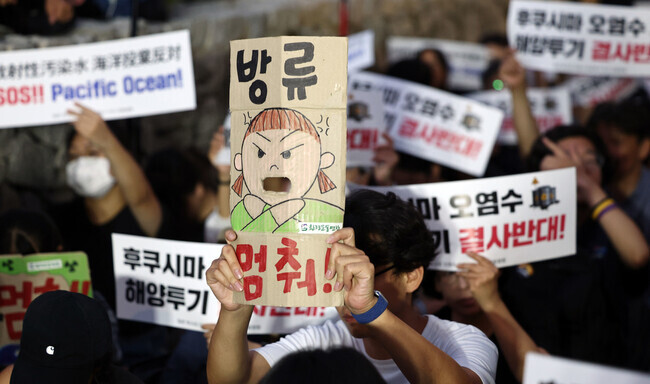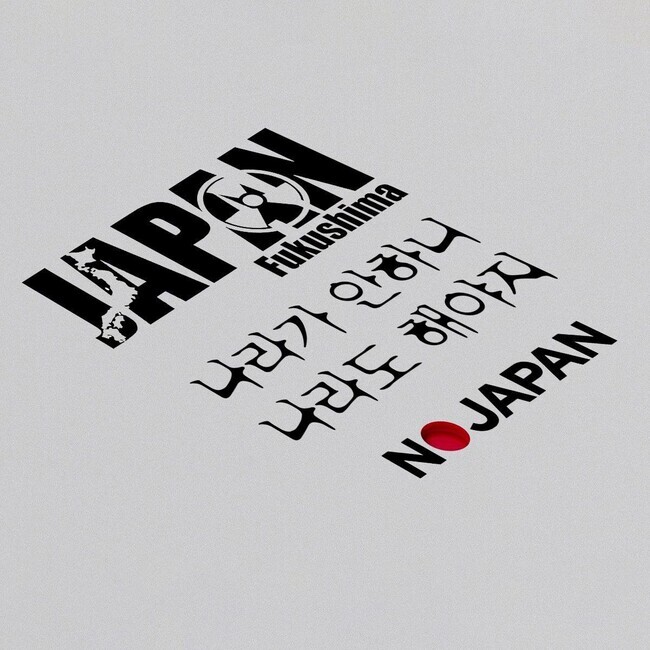hankyoreh
Links to other country sites 다른 나라 사이트 링크
Frustrated by Seoul’s response to Fukushima, Koreans turn to boycotts to voice anger

“I was so angry seeing the administrations’ response that I decided to start a boycott campaign, which is at least one thing that I can do right now.”
With Japan recently beginning to discharge contaminated water from the Fukushima Daiichi nuclear power plant into the ocean, some Koreans have been initiating movements to boycott Japanese products.
The boycott campaigns amount to an outpouring of frustration over the administration’s failure to come up with a clear response to concerns about damage from the release of the radioactively contaminated water.
On Sunday, a 31-year-old parent of a 4-year-old in Seoul’s Mapo District decided to stop drinking Japanese beer, a product they often enjoyed before Japan started dumping the Fukushima wastewater into the ocean.
The parent, identified by the surname Kim, said, “To look at the administrations’ response at a time when the public’s concerns keep growing, it’s enough to leave you wondering whether this is the South Korean government or the Japanese one.”
“I’m not sure what South Korea had to gain politically from the dumping of contaminated water. I’m so exasperated and angry that I plan to do what I can by starting a boycott of Japanese products,” they added.
A 35-year-old resident of Seoul’s Jongno District, also surnamed Kim, said, “I’m fed up with the administration spending government money to make promotional videos insisting that [the water] is ‘not dangerous’ without standing up to the Japanese government at all at a time when the public’s worries have been mounting.”
“Since a boycott is about the only thing I can do, I’m planning to avoid Japanese products for now,” they said.
Since the Japanese government went ahead on Aug. 24 with the release of contaminated water stored at the ruined Fukushima Daiichi nuclear power plant — despite the concerns voiced by Japan’s neighbors and fishers — many social media and online community users have also posted messages announcing that they plan to avoid purchasing Japanese products.
“China implemented a full-scale ban on seafood imports, while South Korea just does promotional campaigns,” one internet user wrote.
“I was already nervous about all the [Japanese] imports after reading in the newspaper about an increase in leukemia cases [in Japan], yet at a time when I’d be worried enough about the [water’s] release even with a full-scale ban in place, it just seems like an ‘everyone for themselves’ situation,” they continued.
“As the parent of a child, this leaves me quaking with anger,” they said.

Other online commenters shared similar sentiments.
“Knowing our government, there’s no way there will be any import restrictions on Japanese seafood. That’s why we need to boycott trips to Japan and Japanese items, you name it,” one commenter wrote. “Maybe then they’ll open their eyes.”
The travel and tourism industries are keeping their eyes peeled amid signs of boycotts following the start of the release of the contaminated water last week.
“Since it’s only been a few days since they started the release, I haven’t picked up on any big trends, but it’s a fact that people are heading to places like Okinawa in southern Japan that are far from the site of the release of the contaminated water in Fukushima in the northeast,” commented a 16-year veteran of the travel industry surnamed Yang, 50. “We’re keeping an eye on whether the boycotts in China will fan the flames of boycotts in Korea as well.”
Once Japan began releasing the waste, there’s been a growing boycott movement in China, where some locals are canceling package trips. China halted imports of all seafood from Japan starting on Thursday, when the dumping began.
On Friday, “Japanese cosmetics” topped the list of popular search terms on Weibo, a Chinese social media site. Lists of cosmetics sourced from Japan made the rounds, with some calling them “radioactive” and urging people to boycott them.
Amid heightened anti-Japanese sentiment in China, the Japanese Embassy in China posted a notice to nationals in the country advising they avoid speaking loudly in Japanese.
By Park Ji-young, staff reporter
Please direct questions or comments to [english@hani.co.kr]

Editorial・opinion
![[Editorial] Intensifying US-China rivalry means Seoul must address uncertainty with Beijing sooner than later [Editorial] Intensifying US-China rivalry means Seoul must address uncertainty with Beijing sooner than later](https://flexible.img.hani.co.kr/flexible/normal/500/300/imgdb/original/2024/0517/8117159322045222.jpg) [Editorial] Intensifying US-China rivalry means Seoul must address uncertainty with Beijing sooner than later
[Editorial] Intensifying US-China rivalry means Seoul must address uncertainty with Beijing sooner than later![[Column] When ‘fairness’ means hate and violence [Column] When ‘fairness’ means hate and violence](https://flexible.img.hani.co.kr/flexible/normal/500/300/imgdb/original/2024/0516/7417158465908824.jpg) [Column] When ‘fairness’ means hate and violence
[Column] When ‘fairness’ means hate and violence- [Editorial] Yoon must stop abusing authority to shield himself from investigation
- [Column] US troop withdrawal from Korea could be the Acheson Line all over
- [Column] How to win back readers who’ve turned to YouTube for news
- [Column] Welcome to the president’s pity party
- [Editorial] Korea must respond firmly to Japan’s attempt to usurp Line
- [Editorial] Transfers of prosecutors investigating Korea’s first lady send chilling message
- [Column] Will Seoul’s ties with Moscow really recover on their own?
- [Column] Samsung’s ‘lost decade’ and Lee Jae-yong’s mismatched chopsticks
Most viewed articles
- 1[Editorial] Transfers of prosecutors investigating Korea’s first lady send chilling message
- 2For new generation of Chinese artists, discontent is disobedience
- 3[Photo] 1,200 prospective teachers call death of teacher “social manslaughter”
- 4[Exclusive] Unearthed memo suggests Gwangju Uprising missing may have been cremated
- 5[Column] Samsung’s ‘lost decade’ and Lee Jae-yong’s mismatched chopsticks
- 6[Column] When ‘fairness’ means hate and violence
- 7Xi, Putin ‘oppose acts of military intimidation’ against N. Korea by US in joint statement
- 8S. Korea “monitoring developments” after report of secret Chinese police station in Seoul
- 9[Special reportage- part I] Elderly prostitution at Jongmyo Park
- 10[News analysis] Samsung in management crisis due to owner risk